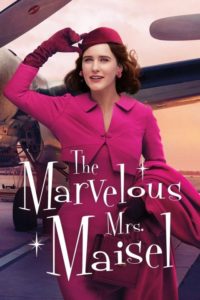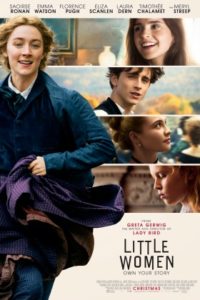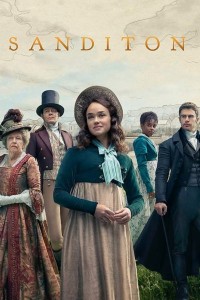Why The Media Shouldn’t Do Revisionist History
 Over the holiday break, I tuned in to one of my favorite TV shows, The Marvelous Mrs. Maisel, which is about “Midge” Maisel, a young, Jewish divorcee pursuing a career as a comedienne in 1950s New York. The storyline closely parallels Joan River’s rise in the comedy world. I liked that it was a fun show about quirky people. I also thought it was a show making a political statement about women’s rights and free speech issues with the Lenny Bruce storyline during the period the show takes place.
Over the holiday break, I tuned in to one of my favorite TV shows, The Marvelous Mrs. Maisel, which is about “Midge” Maisel, a young, Jewish divorcee pursuing a career as a comedienne in 1950s New York. The storyline closely parallels Joan River’s rise in the comedy world. I liked that it was a fun show about quirky people. I also thought it was a show making a political statement about women’s rights and free speech issues with the Lenny Bruce storyline during the period the show takes place.
However, the latest season of the show made me really think the writers are trying to rewrite history. Specifically, I think the show has a blindspot on race issues, and many others agree with me. Maisel seems to operate in a version of 1950s America where racism didn’t seem to happen. At the end of the second season, a new character was introduced to the show named Shy Baldwin, a popular black singer who asks Midge to be his opening act on his nationwide tour. I was hopeful that the show was finally going to address race issues, and specifically, the racial dynamics of a white woman and a black man touring together during the height of the civil rights movement.
The third season begins with the addition of Sterling K. Brown to the cast as Shy’s “black” manager and what would be alluded to later as his secret lover. Cool, I’m down with Randall from This Is Us, and they are really going headfirst into the race issues. But after watching all 10 episodes, I was really left confused and a bit offended. It started in the third episode when the mixed-race touring company enters a fancy Las Vegas hotel front entrance happy and gleeful. This might seem like a small nonissue to many, but to those who are informed about the racial politics at that time, the fact that black people were allowed in the front lobby of a 1960s Las Vegas hotel without any racial angst is just frankly unbelievable.
Las Vegas during this time was really racist towards black people, and that didn’t exclude famous black performers. I remember seeing an interview many years ago either with Lena Horne or Eartha Kitt (I don’t remember who) and she talked about her time being the headlining performer at a Vegas hotel in the early 1960s. She had sold-out shows every night, making millions of dollars for the hotel. Yet, she wasn’t allowed to enter the building through the front lobby and had to leave through the back entrance immediately after performing. She wasn’t even allowed to use the bathroom in the hotel. Could you imagine telling the glamorous Lena Horne or Eartha Kitt that they had to use a bucket in the back of the building?! This form of discrimination was briefly mentioned in a tense exchange between Midge and Shy when he said he was staying on the black side of town because he wasn’t allowed to stay in the hotel he was headling in. This comes only after Shy reveals that he was beaten up by a male suitor. While I appreciate the brief spotlight on LGBT indignities at the time, how is it that the racial indignities of the period which should play a bigger role in the show’s storyline are being ignored?
I think that was a missed opportunity by the show writers to educate the public about our collective histories. I tweeted about this issue, and a woman responded saying that the show shouldn’t delve into serious issues like race because it is a comedy and she wants to take a break from reality sometimes when she watches it. I get the need to just take a break. I don’t think every show needs to be an afterschool special. However, there is a certain level of responsibility when you create work for others to take part in, even if it is fictional work. Maisel is a highly popular show on Amazon Prime Video, which is watched by millions of people worldwide. If you are watching this show outside of America and are not familiar with this country’s history and its racial politics, you would think everything about this show is factual, and that’s the problem.
Also, there is a big difference between creating escapist fantasy and revisionist history. I think the writers are intentionally omitting the racial tension of that time just to not make the (white) viewers feel uncomfortable. I don’t have the same luxury as a black person to omit my history to be comfortable.
 On the other side of this pendulum, there is another question. Should people of color be deliberately added into period pieces that are set in predominately white settings? This question was asked by a Teen Vogue writer who thought the film Little Women should have recast some of the white characters from the book as people of color. Specifically, she thinks the character Theodore “Laurie” Laurence, who is described as Italian, should be recast as black or Hispanic as he has dark features. She says that the “added diversity of casting the character with someone non-white would have added a richness and context that has been lost on the character by contemporary audiences.”
On the other side of this pendulum, there is another question. Should people of color be deliberately added into period pieces that are set in predominately white settings? This question was asked by a Teen Vogue writer who thought the film Little Women should have recast some of the white characters from the book as people of color. Specifically, she thinks the character Theodore “Laurie” Laurence, who is described as Italian, should be recast as black or Hispanic as he has dark features. She says that the “added diversity of casting the character with someone non-white would have added a richness and context that has been lost on the character by contemporary audiences.”
Again, I think this stretches credulity and goes into revisionist history. First of all, the book takes place in Concord, Massachusetts during the Civil War. It is not likely the March sisters interacted with many people of color at that time and place. While Concord played an important role in the Underground Railroad, most blacks who lived there were not usually in the same social class as whites. If they did interact with people of color, they were mostly like in servitude positions, which gets into another debate about doing more films and TV shows with blacks portrayed only as the help or the enslaved.
And, quite frankly, I don’t think people of color need to be purposely injected into white stories for the sole sake of diversity. I would much rather read and watch new stories by and about people of color about their own experiences.
 I just started watching Masterpiece Theater’s latest program, Sanditon, which I think is doing a good job of depicting the racial realities of the character Georgiana Lambe, a mixed-race heiress from the West Indies living in England. Although Sanditon was Jane Austen’s last, unfinished novel, Georgiana is an actual character from the book, which gave the writers the opportunity to explore what her life would have been like at that time. I am only two episodes, but I am thoroughly enjoying it so far. The overt, unrealistic sexual stuff in the first episode is another issue for another day…
I just started watching Masterpiece Theater’s latest program, Sanditon, which I think is doing a good job of depicting the racial realities of the character Georgiana Lambe, a mixed-race heiress from the West Indies living in England. Although Sanditon was Jane Austen’s last, unfinished novel, Georgiana is an actual character from the book, which gave the writers the opportunity to explore what her life would have been like at that time. I am only two episodes, but I am thoroughly enjoying it so far. The overt, unrealistic sexual stuff in the first episode is another issue for another day…
But going back to Maisel, maybe the writers should say their show is science fiction because nothing in it seems to be based in reality. But even then, that is a bit of a stretch. We will see in the fourth season, and that’s if I am still interested in it then.